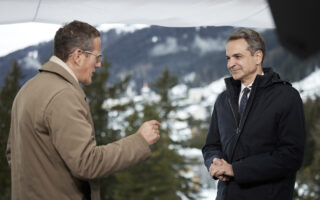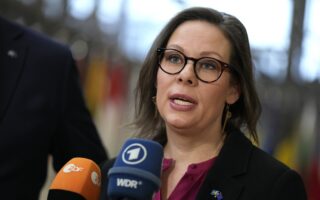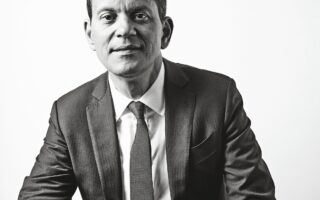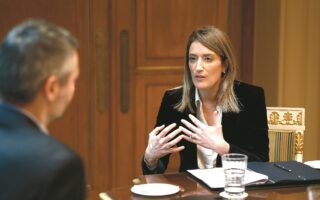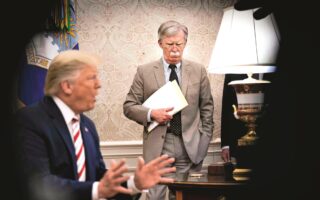Channels of communication with Turkey are working, says shipping minister
Consistent contacts and exchange of information have resulted in the more efficient management of migrant inflows
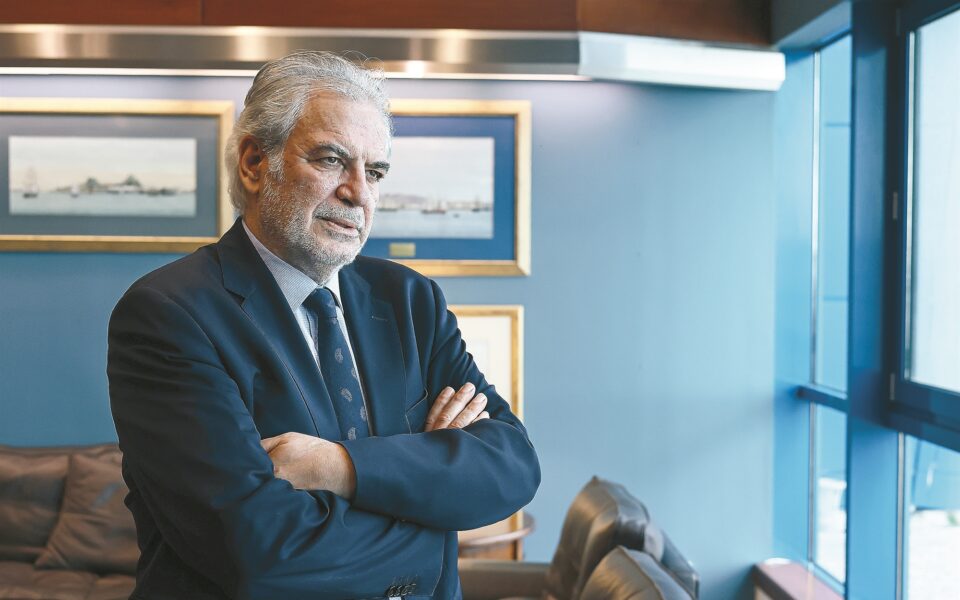
The channels of communication with Ankara are working, which is why tension was avoided at the most recent incident to take place near the uninhabited Imia islets in the southeastern Aegean, Greece’s minister of maritime affairs and island policy, Christos Stylianides, tells Kathimerini.
As far as managing migrant flows is concerned, the former European commissioner for humanitarian aid and crisis management notes that cooperation with the Turkish authorities is constant, but there are no joint patrols nor will there be.
On the matter of the Houthi threat in the Red Sea, Stylianides says that it is imperative for Greece to take part in security operations to protect shipping if it seeks to play an international role.
He also talks about the green transition of shipping and the need for incentives to bring young people back into maritime professions.
What is your assessment of the brief incident recorded at Imia just a few days ago?
As it turned out, it was of minor importance. The channels of communication worked and everything was normalized in a very short time. We continue to maintain a climate of avoiding tension, which, in my opinion, is to the benefit of both countries in these times of geopolitical instability across the region. We deal with such minor incidents, while at the same time protecting Greece’s borders.
Could we say it was a test of how these channels of communication are working?
The channels are open 24 hours a day. We are in constant contact, particularly after my visit to Ankara [in January]. We have had numerous instances where migrant flows have been very efficiently handled because of this constant exchange of information and communication. It was decided in Ankara that the informal cooperation we had until recently should become much more systematic; a joint approach to dealing with the challenges; a convergence of what were two parallel approaches to the migration issue; to try, to the degree that it is possible in a sea with such difficult weather conditions as the Aegean, to be effective in the field, by sharing information. I want to dispel any impression that was created by certain media reports about so-called joint patrols. Such a thing has never been discussed and I think it is wrong to talk about it. A joint approach means a lot of other things; but not joint patrols. What was said in Ankara was the right thing and it was accepted by the Turkish side: that beyond the Greek and Turkish coast guards, the two heads should also be able to communicate when necessary. The head of the Turkish gendarmerie was also present in Ankara and it was agreed that we need to start having results before the smugglers launch the boats into the sea. We have a meeting planned for early March with the regional commanders of the two coast guards so that we can take stock of the first period and see how we can improve on that at the practical and local level.
‘What was confirmed in Ankara, and is confirmed every day in the field, is that a new method of managing migration will be a win-win’
Apart from bilateral cooperation, there’s also the European framework for managing the migration issue.
The matter of amending the 2016 EU-Turkey Joint Statement did not come up during our meetings in Athens and Ankara with Interior Minister Ali Yerlikaya. In my opinion, the Turkish side, for reasons of its own, is seeking to create a model of Greek-Turkish cooperation on the migration issue. In so doing, it is sending a message to the EU partners that Turkey is a reliable partner on migration. They want to stop being the “transit” country to Europe, by any means. What was confirmed in Ankara, and is confirmed every day in the field, is that a new method of managing migration will be a win-win. It has reduced inflows to Greece and the pressure on reception facilities, and Greece will no longer be a “transit” country either.
Aren’t they interested in Europe sharing the economic burden?
They’d like that, but for the time being they are not bringing it into the conversation about the management of migrant flows between Greece and Turkey, or even in the triangle with Bulgaria.
Is the weather possibly playing some role? Is a fresh spike in flows likely as the weather improves?
It’s the other way around. Gale-force winds suit the smugglers – who couldn’t care less about human life – because they restrict the authorities’ ability to respond. In such conditions, there is always the risk that we may not be able to save people – and we are interested in protecting human life, above all else. Bad weather is our biggest problem. Let me just convey the latest briefing from the chief of the coast guard. [On one recent] Sunday, we had just three incidents [of migrant boat arrivals] on Chios and two on Lesvos, and he confirmed that the rackets don’t work when the weather is fair because both sides are in full operational readiness. There was one day when we had winds of 7-8 Beaufort and had as many as 280 people land on Lesvos.
As European commissioner, you visited many different parts of the world, including some in Africa. How can the issue of migration be dealt with at the source?
Migration is a perpetual phenomenon. Every human being would try to seek a better life. People in areas that are in crisis, living in war or poverty, want to move. Restricting migration from conflict zones is not easy, so the question is about dealing with the causes of the conflicts. There are conflicts in Africa that stem from the devastating consequences of the climate crisis, like protracted droughts and shortages of water. So Africa is the big challenge for Europe – and not only. As European commissioner, I had submitted a proposal for a new EU-Africa partnership aimed at dealing with the causes of migration from Africa. We have already seen that humanitarian aid and economic assistance do not work, so we need to take a fresh look at the connections between humanitarian and development aid, and to see how we can increase jobs on the African continent. This needs to be a systematic effort and it needs to focus on developing the agricultural sector in Africa.
Let us turn to the Red Sea and the challenges to shipping there. How is the situation evolving?
It’s a global issue, as the situation in the Red Sea is exacerbating existing inflationary pressures. Greece, for its part, is a global shipping leader and the first in Europe, so the prime minister was absolutely right in deciding the country’s participation in operations Prosperity Guardian and the EU’s Aspides. I would call it “Venizelian reliability”: The great Greek statesman knew that if you wanted a role on the international chessboard, you had to be reliable in a crisis. If you’re absent in a crisis, you’re absent altogether – from the benefits, too.
Your portfolio also includes some real hot-button issues like the green transition of shipping.
Greece has a super-weapon: its shipping and the people of its maritime industry. We’re talking about an enormous pool of know-how. I would like to say something personal on this matter: I have held all kinds of positions in Cyprus and then in the EU as a commissioner, but the first time I felt so powerful in a negotiation was as shipping minister for Greece. Greece counts, everywhere, at every shipping forum. This is why we got Greece elected to the International Maritime Organization (IMO) Council, in spite of the challenging geopolitical situation and all the different opposing trends. Because of our role, the European Commission also realized that the EU needs to work systematically with the IMO on matters related to the green transition; otherwise, European shipping is at risk of being left on the sidelines. As leader in EU shipping, Greece holds the EU flag high. And we can also serve as a bridge between the EU and the IMO. We are in a good place in negotiations with the EU for new funding tools to support European and Greek shipping on the path of this transition. We have very good cooperation with the deputy minister of finance, Nikos Papathanasis, who managed the Recovery Fund, and we expect confirmation of these very positive developments in the next few days. The funding through European resources for building new green and hybrid ships is expected to be approved. The prime minister has said something very wise: that we need to be radical about our green goals but also realistic. Otherwise, we all risk exposure and self-harm as European shipping. Serious research and studies are being carried out as we speak on green fuels, but certain crucial parameters have not been clarified, which is why the infrastructure is not ready yet. We launched an initiative at the European level on how European shipping can maintain its leading role by ending the differentiation between North and South in the industry. We will seek to upgrade shipping within the European institutions and I have already embarked on a tour of Europe to this end.
Why are maritime professions no longer attractive to Greeks?
It’s a global problem. Expert estimates have suggested that global shipping will need around 800,000 staff over the next few years. So you can imagine how many people Greek shipping needs, given its turnover and the number of Greek-owned ships. This is regardless of whether we transition to semi-autonomous ships at some point. It is a matter of absolute urgency to make maritime professions attractive again. We need incentives. We have already named 2024 as the Year of Maritime Education. Above all, we want to strengthen the Greek flag so that more jobs for Greek sailors are also created. Many of the young sailors studying at naval academies right now come from the mainland, from Macedonia and Epirus, rather than the islands. This shows that young people have other career options on the islands. I have set a wager with myself to elevate maritime education.
What is the plan for upgrading the country’s aged port infrastructure?
The decade-long crisis delayed a lot of things. Now we’re trying to catch up. We have found a satisfactory amount of European funding and will start with small ports, on the islands. It will take a lot of time and money for us to have the port infrastructure to serve coastal shipping and yachting. I promise no miracles, but we have started and that’s a good thing. I also believe that we need to consider private-public partnerships for some ports. There’s also an idea for using the airport slot model at ports too. It’s not an easy target, but it will help improve safety.
